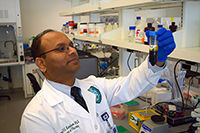 Tulane University School of Medicine is one of the top medical schools in the south. The faculty in our pharmacology graduate training program are dedicated to the concept of instilling a breadth of training during the first 2 years of graduate education, followed by an in-depth training in the student's area of dissertation research. The research activities of the pharmacology faculty at Tulane cover a wide spectrum of topics. The number of graduate students in pharmacology is kept to a maximum of 16-18 students, so that the 9 core faculty can give close and personal attention to each student.Read More
Tulane University School of Medicine is one of the top medical schools in the south. The faculty in our pharmacology graduate training program are dedicated to the concept of instilling a breadth of training during the first 2 years of graduate education, followed by an in-depth training in the student's area of dissertation research. The research activities of the pharmacology faculty at Tulane cover a wide spectrum of topics. The number of graduate students in pharmacology is kept to a maximum of 16-18 students, so that the 9 core faculty can give close and personal attention to each student.Read More
The Doctoral Program in Pharmacology conforms to the regulations of the Biomedical Sciences Graduate Program in which all doctoral students in the School of Medicine take the same multidisciplinary courses during the first year, and then select a discipline as their choice during the second year to pursue their research goals. The areas of research interest in pharmacology include cardiovascular, endocrine, cancer, viral, environmental, gene therapy and neuropharmacology. Graduate students after completing the core curriculum take selected lectures in medical pharmacology, principles of pharmacology and other elective courses.
Program Objectives
The objectives of the PhD degree program are to produce well trained scientists who have a firm broad foundation in pharmacology, but who have definite interests and expertise in a particular sub-discipline or area. PhD's will be trained with emphasis in preparing them to do postdoctoral study in an academic pharmacology department, at the same time recognizing that some graduates may elect for a career in industrial pharmacology.
